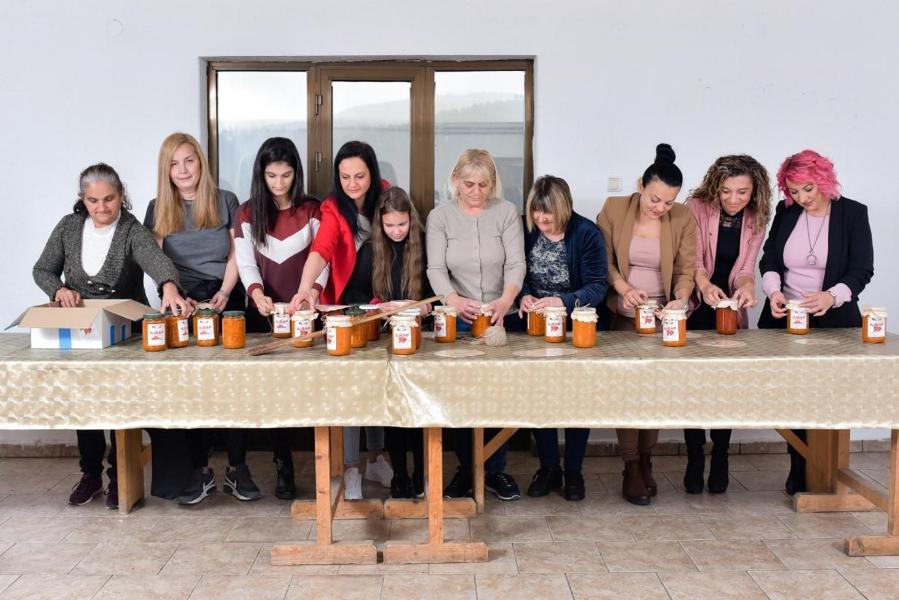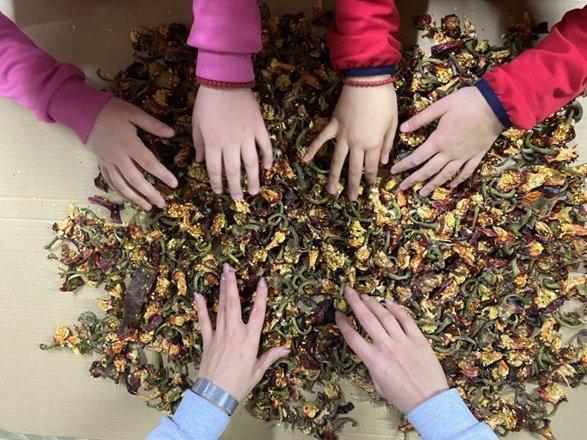EU green programmes help Serbian women start their own businesses
Ajvar is a traditional and popular red pepper paste used in cooking and snacking in Serbia and other Balkan countries. Companies that make ajvar end up with a lot of food waste such as stems and seeds. Usually, these leftovers are thrown in the trash.
Jelena Miletić, owner of the company Homeland in the Jar, located in Medvedja in southern Serbia, wanted to do something good with these leftovers. In the southeastern Jablanica District, where Miletić runs her company, some 21,000 tons of waste is generated during each production season of ajvar.
“As a mother of two and a rural household owner, I urgently needed to find work that I could do throughout the year,” Miletić says, explaining how hard it is to find employment in rural areas and how she came up with the idea to use big batches of red pepper waste to make bio-soaps and facial masks. “Before, I literally had an income only two to three months a year.”
To help carry out her idea, she joined the Bio Idea for Sustainable Development Association, a local organisation encouraging the production of natural cosmetics. A European Union initiative called the EU for Green Agenda in Serbia is helping this association grow by expanding its network of businesses and admitting new members free of charge.
Female entrepreneurship
’’We provide women who don’t have adequate resources with know-how for the production of soaps and candles, so that they can start their own business and pass on their expertise to others,“ says Sanida Klarić, president of Bio Idea.

Jelena Miletić, fourth from left, came up with an idea to use red pepper waste for producing natural cosmetics. (UNDP Serbia)
The association also helps businesses buy supplies together and offer group sales, primarily through agreements with socially responsible companies that purchase these ecological products.
“It’s very important that women recognise their interest in treating bio-waste at the point of origin, with tiny and simple tweaks in the manufacturing process,” says Klarić, adding that the waste-reduction concept is applicable to peppers and other products such as apricots and rosehip.
Apart from promoting circular entrepreneurship among women and improving incomes in rural areas, the association’s anti-waste programme fights climate change by reducing waste in landfills, which cuts greenhouse gas emissions.
Closing the circle
“The linear economy works in line with the use-and-throw away principle, while the circular economy closes the circle,” Miletić says. “We dry the rest of the pepper, grind it, integrate it into soaps and no waste remains.”
Both women say that more support is needed for female entrepreneurship and sustainable projects. The Bio Idea association, which focuses on helping women, was selected as one of the best projects for the green transition in Serbia under the EU for Green Agenda programme in Serbia. This selection allowed the association to receive EU support, such as training that taught around 100 women from Serbian rural households how to create and run their own businesses. A new challenge for green ideas will remain open until the end of 2026, offering support for projects that fall under the umbrella of the EU Green Agenda for the Western Balkans.

Green innovation for small businesses
The green agenda initiative in Serbia is financially supported by the European Union and implemented by the United Nations Development Programme and the Serbian Ministry of Environmental Protection, in cooperation with the European Investment Bank. Additional funding and assistance were provided by Sweden and Switzerland. The EU bank’s role in the initiative is to provide technical support to prepare projects that can obtain financing from other banks.
“These kinds of partnerships strongly contribute to green innovation among small and medium enterprises, while providing more inclusive and sustainable jobs for the wider community,” says Alessandro Bragonzi, head of the Western Balkans region for the European Investment Bank. “Our surveys show that 10% of companies in the Western Balkans are reporting losses suffered from extreme weather conditions, and only 21% of them invest in energy efficiency, while 59% do not see such investments as a priority.”
The Green Agenda initiative in Serbia is financially supported by the European Union and implemented by United Nations Development Programme, in partnership with the Serbian Ministry of Environmental Protection, and in cooperation with the Embassy of Sweden and the European Investment Bank (EIB), with additional funding from the governments of Sweden, Switzerland and Serbia. The EU bank’s role in the initiative is to provide technical support to prepare projects that can obtain financing from other banks.
